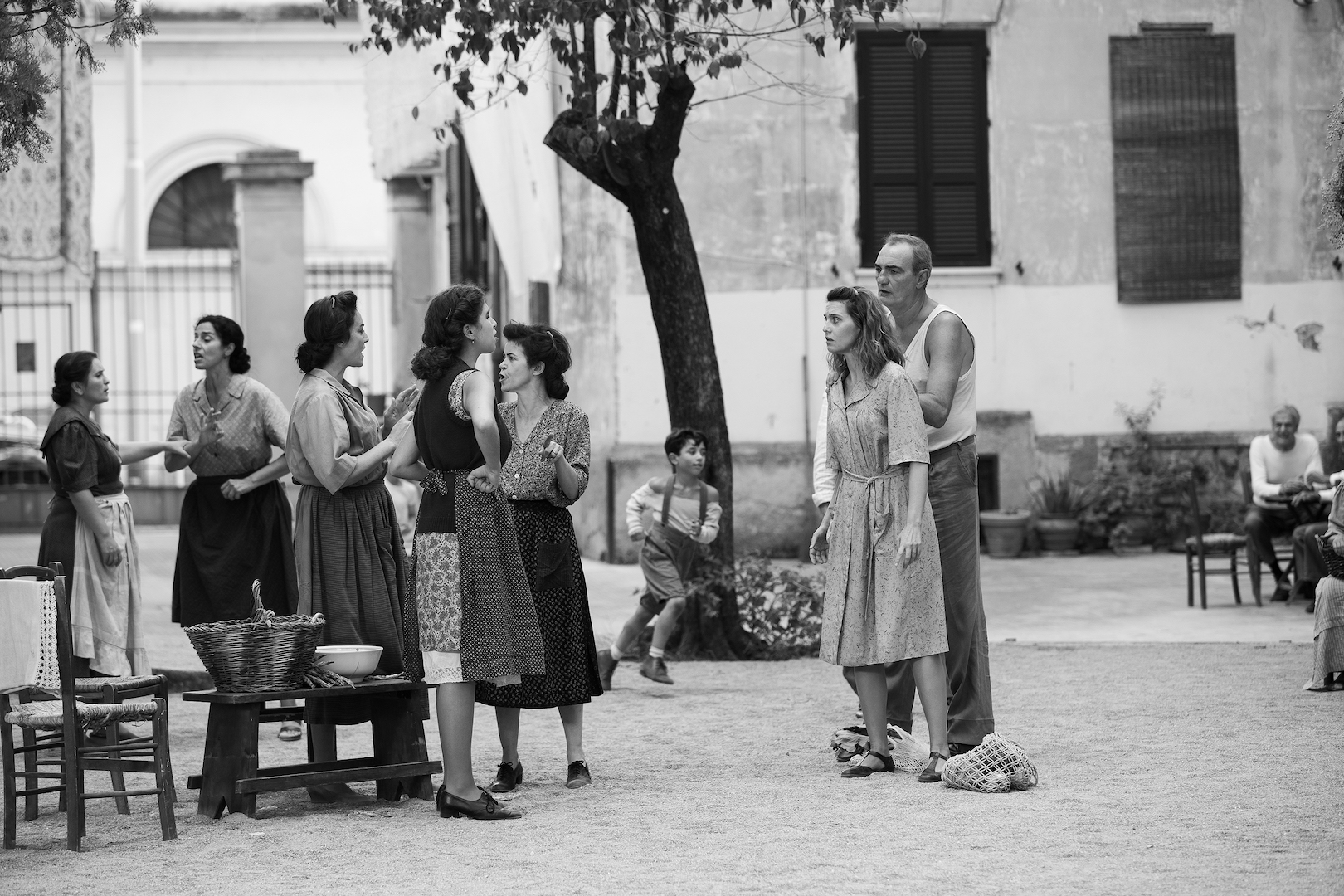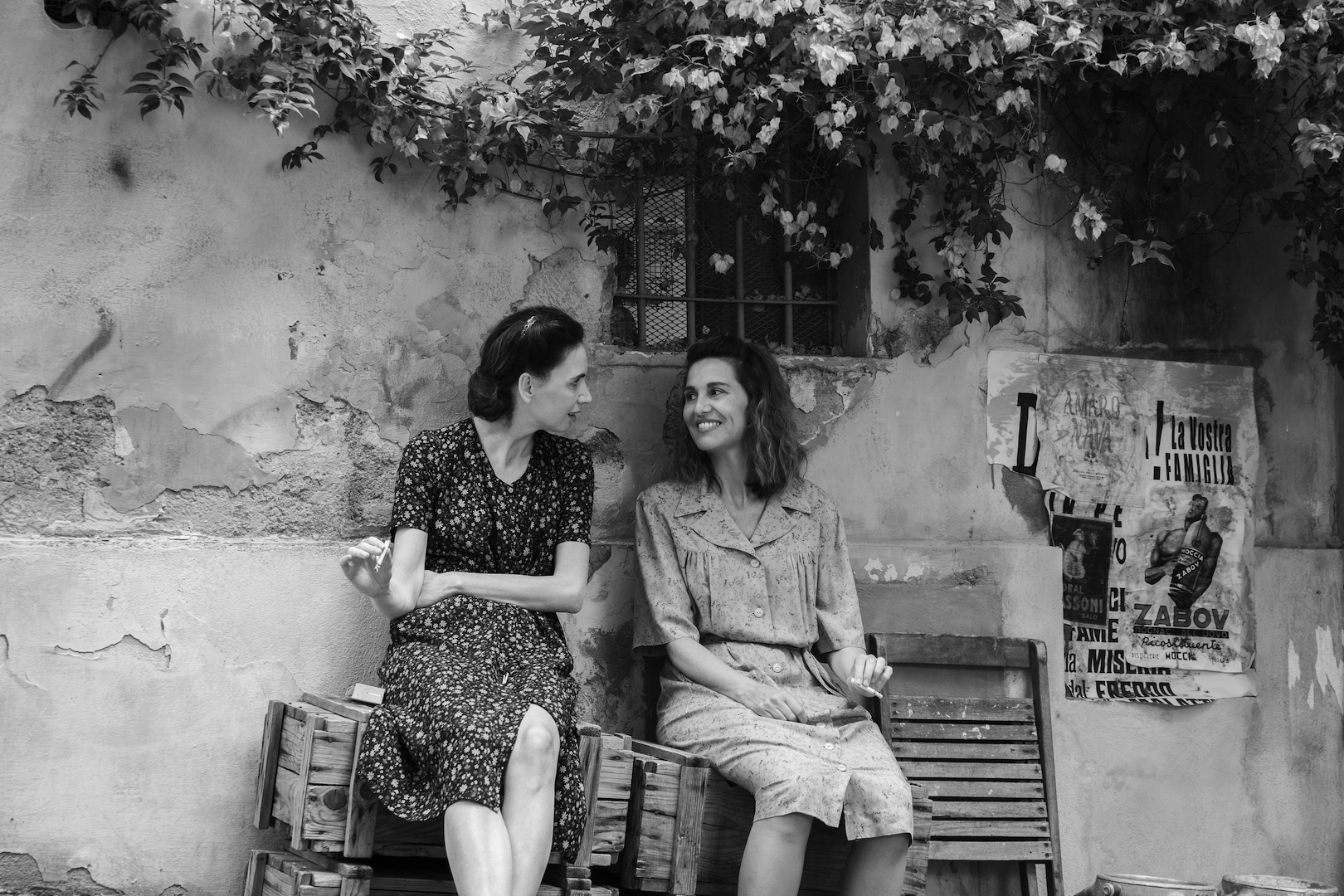
We use cookies
We use cookies and other tracking technologies to improve your browsing experience on our website, to show you personalized content and targeted ads, to analyze our website traffic, and to understand where our visitors are coming from.


Paola Cortellesi’s directorial debut C’è ancora domani, whose black and white palette gives it a neorealist imprint, is the story of a family in the latter half of the 1940s in a Rome caught between the positive energy resulting from liberation and the miseries caused by the recently ended conflict.
She plays Delia, wife of Ivano and mother of three. She is defined by the roles of wife and mother which appears to satisfy her. Valerio Mastandrea plays Ivano, the undisputed head of the family, who supports them financially and never misses an opportunity to underline it, sometimes with contemptuous tones, other times directly with his belt. Ivano respects only his father, Sor Ottorino (Giorgio Colangeli), a rancorous, despotic old man that Delia has become nurse to. Delia’s only source of solace is her friend Marisa (Emanuela Fanelli), with whom she shares some carefree moments and secrets.
The family lives in a miserable basement flat, built on a soundstage in Cinecittà. The set designer, Paola Comencini, created a home reminiscent of Luchino Visconti’s Bellissima (1951) which starred Anna Magnani.
The exteriors, however, are real; part of a condominium complex in Testaccio in via Bodoni 98, on the corner with via Torricelli and just steps from the river Tiber. A gate leads to the courtyard overlooked by the small windows of the basement flat which Delia opens every morning.
It is spring and the family is excited about the imminent engagement of the eldest child, Marcella (Romana Maggiora Vergano) who, on her part, is hoping to marry Giulio (Francesco Centorame) –a steady chap from a middle-class family – fast and rid herself of her embarrassing family.
Delia also asks for nothing more than this, she accept the life she was given and a good marriage for her daughter is all she aspires to. After finishing her domestic chores, Delia’s daily routine continues outside the flat, with the many odd jobs that provide her with a small amount of money to bring home. Beyond that little gate, via Bodoni is filled with a range of people trying to survive as best they can in the hard years immediately after the war. Delia is one of them as she walks briskly, beneath the opening titles to the punk blues soundtrack of Blues Explosion’s Calvin.
Her first stop is the building where the wealthy notary and his family live, the exteriors are in via della Madonna dei Monti, in the ancient district of Monti (the interiors are an elegant building in via Cola di Rienzo); then she goes to a haberdashery (via Locchi 4, in Parioli); an umbrella shop in Torpignattara (where Ivano also plays cards with his friends); and the terrace of a building overlooking the Vittoriano and the roofs and domes of Rome. She runs into anAmerican checkpoint on via Flavio Gioia near Lungotevere Testaccio, not far from via Bodoni where she meets William the soldier.

The market where Marisa has a fruit and vegetable stand was built in piazza Testaccio: while the alleyway with steps where she and Delia smoke on a rare break apparently behind the market is actually in via degli Ibernesi(Monti).
Walking along the twisty via di Monte Testaccio, a semi-deserted street with closed and partly dilapidated premises, Delia comes across Nino (Vinicio Marchioni) near number 72, a childhood love who lives and has his workshop here.
The bakery, grocery store and butcher's shop where women queue with their ration books for pasta and other goods are located in via Antonio Cecchi. The butcher’s sign visible between numbers 24 and 26, is from the film. Just around the corner is the Moretti ice cream parlour, belonging to Giulio's family – which later explodes – actually historic Bar Giolitti at via Amerigo Vespucci 35, a neighbourhood institution since 1914.
A change of setting marks the flashbacks narrating Delia and Ivano's relationship; to the alleys of Trastevere, the district which also includes the Church of Santa Maria in Cappella where they got married. The school scene was filmed in the former Carlo Forlanini hospital, in Monteverde; the spectacular staircase once the entrance to the morgue.
Even the church where Delia and her family attend a ceremony is not located in Testaccio but in the Sant'Angelo district: it is dedicated to Santa Caterina dei Funari. There Delia gets some news which threaten to derail the plans she developed after receiving a mysterious letter, one which provided her with the courage to imagine a better future. And not just for her.

Paola Cortellesi’s directorial debut C’è ancora domani, whose black and white palette gives it a neorealist imprint, is the story of a family in the latter half of the 1940s in a Rome caught between the positive energy resulting from liberation and the miseries caused by the recently ended conflict.
She plays Delia, wife of Ivano and mother of three. She is defined by the roles of wife and mother which appears to satisfy her. Valerio Mastandrea plays Ivano, the undisputed head of the family, who supports them financially and never misses an opportunity to underline it, sometimes with contemptuous tones, other times directly with his belt. Ivano respects only his father, Sor Ottorino (Giorgio Colangeli), a rancorous, despotic old man that Delia has become nurse to. Delia’s only source of solace is her friend Marisa (Emanuela Fanelli), with whom she shares some carefree moments and secrets.
The family lives in a miserable basement flat, built on a soundstage in Cinecittà. The set designer, Paola Comencini, created a home reminiscent of Luchino Visconti’s Bellissima (1951) which starred Anna Magnani.
The exteriors, however, are real; part of a condominium complex in Testaccio in via Bodoni 98, on the corner with via Torricelli and just steps from the river Tiber. A gate leads to the courtyard overlooked by the small windows of the basement flat which Delia opens every morning.
It is spring and the family is excited about the imminent engagement of the eldest child, Marcella (Romana Maggiora Vergano) who, on her part, is hoping to marry Giulio (Francesco Centorame) –a steady chap from a middle-class family – fast and rid herself of her embarrassing family.
Delia also asks for nothing more than this, she accept the life she was given and a good marriage for her daughter is all she aspires to. After finishing her domestic chores, Delia’s daily routine continues outside the flat, with the many odd jobs that provide her with a small amount of money to bring home. Beyond that little gate, via Bodoni is filled with a range of people trying to survive as best they can in the hard years immediately after the war. Delia is one of them as she walks briskly, beneath the opening titles to the punk blues soundtrack of Blues Explosion’s Calvin.
Her first stop is the building where the wealthy notary and his family live, the exteriors are in via della Madonna dei Monti, in the ancient district of Monti (the interiors are an elegant building in via Cola di Rienzo); then she goes to a haberdashery (via Locchi 4, in Parioli); an umbrella shop in Torpignattara (where Ivano also plays cards with his friends); and the terrace of a building overlooking the Vittoriano and the roofs and domes of Rome. She runs into anAmerican checkpoint on via Flavio Gioia near Lungotevere Testaccio, not far from via Bodoni where she meets William the soldier.

The market where Marisa has a fruit and vegetable stand was built in piazza Testaccio: while the alleyway with steps where she and Delia smoke on a rare break apparently behind the market is actually in via degli Ibernesi(Monti).
Walking along the twisty via di Monte Testaccio, a semi-deserted street with closed and partly dilapidated premises, Delia comes across Nino (Vinicio Marchioni) near number 72, a childhood love who lives and has his workshop here.
The bakery, grocery store and butcher's shop where women queue with their ration books for pasta and other goods are located in via Antonio Cecchi. The butcher’s sign visible between numbers 24 and 26, is from the film. Just around the corner is the Moretti ice cream parlour, belonging to Giulio's family – which later explodes – actually historic Bar Giolitti at via Amerigo Vespucci 35, a neighbourhood institution since 1914.
A change of setting marks the flashbacks narrating Delia and Ivano's relationship; to the alleys of Trastevere, the district which also includes the Church of Santa Maria in Cappella where they got married. The school scene was filmed in the former Carlo Forlanini hospital, in Monteverde; the spectacular staircase once the entrance to the morgue.
Even the church where Delia and her family attend a ceremony is not located in Testaccio but in the Sant'Angelo district: it is dedicated to Santa Caterina dei Funari. There Delia gets some news which threaten to derail the plans she developed after receiving a mysterious letter, one which provided her with the courage to imagine a better future. And not just for her.
